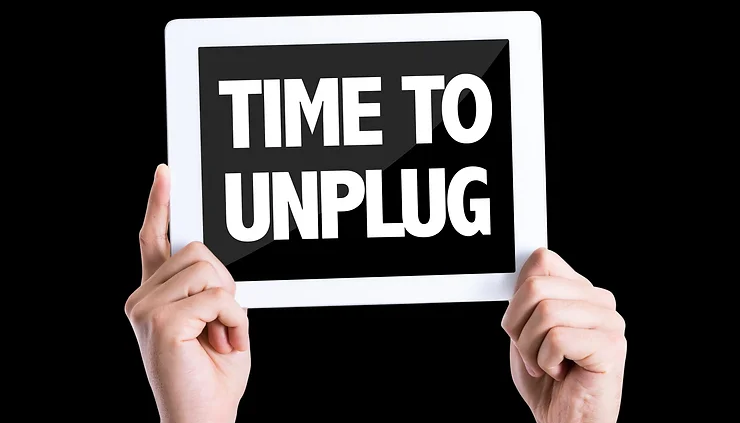Four Tips on How to Unplug from Work and Gain Time to Recharge
As a career coach, my clients often share that the expectation to work additional hours and to increase productivity is ever growing. The work load intensity and relentless pressure to pump out more can be overwhelming and exhausting. Many of my clients indicate that this workload expectation has led to burnout and that our digital diet is a contributor.
In a study from the University of Maryland, researchers discovered when students unplugged from technology, they reported an improved quality of life. Their improved quality of life was defined as having spent more time with family and friends, more frequent exercise, cooking and eating healthier foods. 84% of Americans report they couldn’t go a single day without their device, according to the Pew Research Center. And half of all Americans regularly sleep next to their phones to avoid missing out.
Whether the expectation from your employer is explicit or not, the “workplace” today has loose and undefined boundaries about where working should occur. The workforce is engaging in work anytime, anywhere, and in any place. Of course, there are huge benefits to the limitless ways that work can get done today. The down side is that employing this “anytime, anywhere, anyplace” work practice can lead to higher stress levels, less productivity, decreased hours of sleep and negative impacts on your personal relationships.
So here are 4 tips on how to unplug and recharge during your non-working hours:
Tip # 1: Triage emails and text messages.
In the medical world, emergency service providers triage patient care. Triaging is the process of prioritizing treatment based on the presenting condition. You can use the same process when determining when you should respond to work-related emails and text messages.
You can start by determining the ones that require immediate attention, a response by the next business day or within the next few days to a week. Don’t respond to non-critical emails during after work hours. Even if it is something you can respond to quickly, wait until your next workday begins. You may find by triaging your text messages and emails you will reduce the amount of time you are “working” during non-working hours.
Tip # 2: Do things that require focus.
Stop thinking about work, engage in activities that require your undivided time and attention. Pick an activity or hobby that requires your full attention such as cooking, reading, painting, playing video games or cards, etc. Immerse yourself in activities that you enjoy, get you jazzed up and requires your full engagement.
Be intentional and give yourself permission to engage in activities that will divert your attention and provide you with another focus and direction. You should center in on an activity that interests you and with one that allows you to get a little “lost”.
Tip # 3: Try Shinrin-yoku or forest bathing.
Shinrin-yoku “means taking in the forest atmosphere”. Shinrin-yoku was developed in Japan in the 1980’s and has become the cornerstone of preventative healthcare and healing in Japanese medicine.” Shinrin-yoku is the activity where you intentionally indulge in the sights, smells and sounds of nature.
“If you walk in a relaxed manner, there are calming, rejuvenating and restorative benefits to be achieved.”
Carve out 20-30 minutes during your time off to take a walk and reap the benefits that nature has to offer. It feels good to get outside, to breath in the fresh air, to smell and take in all the sensory experiences during your nature walk. Read more to see the scientific evidence of the benefits of Shinrin-yoku.
Tip # 4: QT with family and friends
Intentionally carve out and spend quality time with family and friends. Show the important people in your world that your continued connection with them is vital. Nourish and cultivate your key relationships. Commit to spending time each day with the important people in your lives and be present with them.
Get caught up to speed about what is going on in their world. Talk, ask questions, be curious and engaged in each important person’s life. The small, consistent and attentive time with loved ones are powerful connectors. Stay in touch.
As challenging as unplugging from work may seem, it is analogous to any habit that you are trying to change or shift. Replacing your old behaviors and implementing new ones take consistency and time. Adopting one or any of these tips will lead you on a path to re-focus your attention in other areas of your life. As opposed to asking what you will lose ask yourself what you will gain.
I read a cool bumper sticker the other day. It said, “Sometimes we need to disconnect in order to reconnect with what matters.” Challenge yourself to be temporarily closed for spiritual maintenance.






